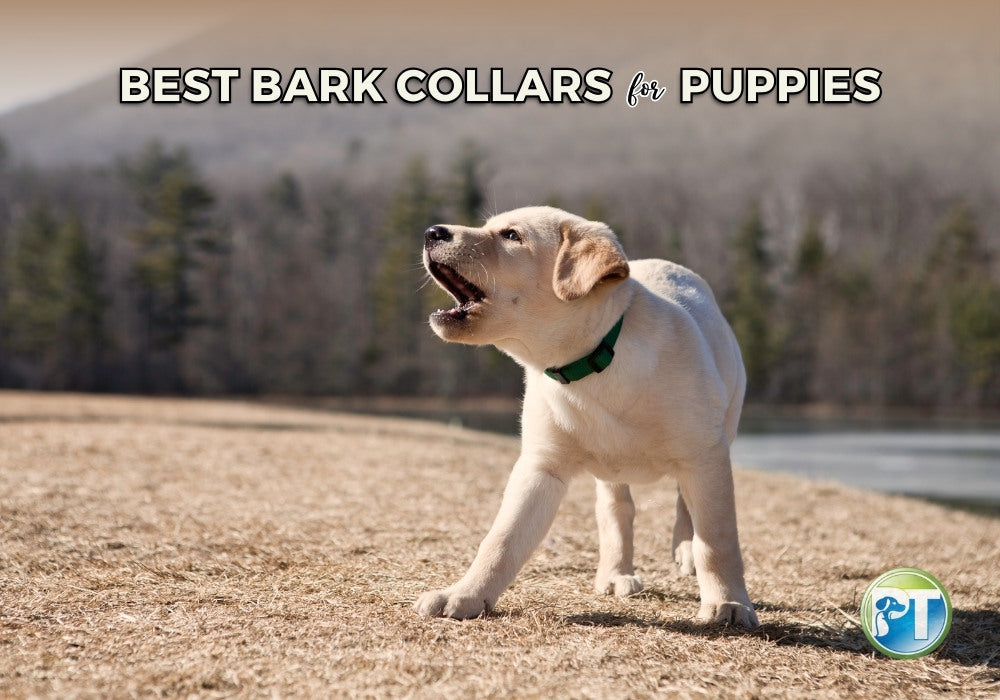Best Bark Collars for Puppies – Safe Training Solutions for Young Dogs

Excessive barking presents a common challenge for many new dog owners. While it's natural for puppies to bark as a form of communication, constant barking can quickly become a problem. It can be frustrating for you and your family and can also lead to complaints from your neighbors. To address this issue, many owners turn to bark collars as a potential solution.
In this blog post, we'll dive into the factors you should consider when selecting a bark collar for your furry friend. More importantly, we'll discuss how these collars can complement your overall training approach to shape your pup's behavior.
Why Address Excessive Barking in Puppies?
Controlling excessive barking in puppies is important for a number of reasons. First and foremost, it helps maintain a peaceful environment in your home and neighborhood. Incessant barking can be stressful and disruptive, leading to tension and even conflict with those around you. Additionally, letting your puppy bark excessively can reinforce the behavior, making it harder to break the habit later. By addressing the issue early on, you can help your puppy learn when barking is appropriate and when it's time to settle down.
How Bark Collars Work

Bark collars are designed to discourage excessive barking by delivering a correction when your puppy barks. The type of correction varies depending on the collar, but common options include vibrations, sprays, ultrasonic sounds, and static shocks. The unpleasant sensation will interrupt the barking behavior, eventually teaching them to associate excessive barking with an unwanted consequence. Through consistent training alongside the collar, your pup can learn to associate barking with the correction and eventually quiet down.
Types of Bark Collars
Bark collars can be a valuable tool in your training arsenal. However, with various types of bark collars available, choosing the right one can be overwhelming. Let's explore the four main types of bark collars and their unique approaches to deterring barking:
1. Static Bark Collars
These deliver a low-level static shock when the dog barks. The intensity is usually adjustable, allowing you to find the level that's most effective for your dog's size and sensitivity.
2. Spray Bark Collars
These emit a burst of either citronella spray or unscented mist towards their nose. The spray is unpleasant but harmless, discouraging further barking. This option is often considered gentler for sensitive pups who might be startled by vibrations or sounds.
3. Vibration Bark Collars
These collars vibrate when the dog barks, offering a gentler correction than a static shock. This method might be particularly suitable for noise-sensitive pups who might be startled by a spray or sound.
4. Ultrasonic Bark Collars
These emit a high-frequency sound that only dogs can hear. The sound is meant to be a deterrent, but its effectiveness can vary depending on the environment and individual dog.
Factors to Consider When Choosing a Bark Collar for Puppies
When selecting a bark collar for your puppy, there are several important factors to consider:
1. Age and Size of the Puppy
Choosing the right size collar is crucial for your puppy's comfort and safety.
- Age: Generally, bark collars are not recommended for puppies under 6 months old. Their communication skills are still developing, and positive reinforcement training should be the primary focus at this stage.
- Size: Not all collars are created equal. Ensure the collar you choose is designed for your pup's size and weight. A collar that's too big might be uncomfortable or slip off, while one that's too small might not make proper contact.

2. Sensitivity Level of the Puppy
Every puppy is unique and may react differently to various types of correction. Some puppies are more sensitive and may respond well to gentler corrections like vibration or ultrasonic sound. Others may be more stubborn and require a stronger correction like static stimulation. Choose a bark collar that effectively gets their attention without causing any unnecessary stress or anxiety.
3. Adjustability of the Collar
Puppies grow quickly, so it's important to choose a bark collar that can adapt to their changing size. Look for collars with adjustable straps to ensure a proper fit as your puppy grows. A well-fitting collar is more comfortable for your puppy and more effective at delivering corrections.

4. Battery Life and Rechargeability
Bark collars rely on batteries to function, so battery life is an important consideration. Some collars use replaceable batteries, while others have rechargeable batteries. Rechargeable collars can save you money in the long run, but they may require more frequent charging. Consider your lifestyle and how often you plan to use the collar when deciding between disposable and rechargeable options.
5. Waterproof Features
If your puppy loves to play in the water, a waterproof or water-resistant bark collar is a must. Look for collars that are specifically designed to withstand exposure to water. This will protect the electronic components from damage, ensuring the collar keeps working even if it gets wet.
Buyer's Guide: The Best Bark Collars for Puppies
Discover our curated selection of bark collars tailored for puppies, showcasing their key features and suitability for different dog sizes.
1. BP-504 Barkless Pro Anti Bark Collar by E-Collar Technologies
Best for Dog Size: 5 pounds and up
Collar Receiver Size: 2.36” x 1.57” x 1.57”
Collar Receiver Weight: 1.9 oz
The BP-504 Barkless Pro Anti-Bark Collar from Educator has an advanced vibration sensor that accurately detects barking, effectively reducing false corrections. This collar offers 9 levels of stimulation, 3 stimulation modes, and 3 different levels of bark sensitivity.
This dog bark collar also comes with an auto-mode feature that automatically adjusts the stim level based on the barking intensity. A tone-only mode is also available for users who prefer not to use static correction. The collar is waterproof and shock-resistant, ensuring its durability in any weather condition.
2. Dogwatch BT-7 No-Bark Trainer
Best for Dog Size: 4 Pounds and Up
Collar Receiver Size: 2.67” x 1.18” x 1.57”
Collar Receiver Weight: 1.7 oz
The DogWatch BT-7 No-Bark Trainer features 7 static levels and a vibration option, allowing you to tailor the correction to your dog's needs. It comes with short and extended prongs to ensure optimal contact.
Its Bark Forgiveness feature introduces a brief delay before correction, allowing your dog to distinguish between acceptable and excessive barking. This reinforces that while occasional barking is normal, excessive barking is not tolerated.
3. PetSafe Elite Little Dog Spray Bark Collar (PBC00-11283)
Best for Dog Size: 8 Pounds and Up
Collar Receiver Size: 1.7” x 1.06” x 0.98”
Collar Receiver Weight: 2.26 oz
The PetSafe Elite Little Dog Spray Bark Collar keeps small pups in mind with its lightweight, compact design. This collar uses a gentle citronella spray to discourage barking whenever your furry friend gets vocal. Its built-in Perfect Bark® Technology ensures the spray activates only on your dog's bark, preventing false corrections from outside noises. The refillable collar holds enough spray for 30-40 uses, and each refill canister lasts for up to 300-400 sprays.
This bark collar device is waterproof, allowing your pup to play freely in any weather. Plus, the collar is adjustable to fit necks up to 16 inches and uses a replaceable RFA-188 battery (included) for long-lasting use.
4. PetSafe Lite Rechargeable Bark Collar (PBC00-16446)
Best for Dog Size: 8 Pounds and Up
Collar Receiver Size: 2.16” x 1.46” x 1.05”
Collar Receiver Weight: 1.44 oz
The PetSafe Lite Rechargeable Bark Collar is a static stimulation collar. Its best feature is the automatically adjusting levels of correction. This means the correction level will increase until your dog stops barking when it will immediately return to the lowest levels. This collar also has mild correction levels, making it ideal for small dogs and sensitive and shy dogs.
5. PetSafe Vibration Bark Collar (PBC00-12789)
Best for Dog Size: 8 Pounds and Up
Collar Receiver Size: 2.24” x 1.06” x 1.1”
Collar Receiver Weight: 2.61 oz
The PetSafe Vibration Bark Control Collar utilizes Perfect Bark® Sound & Vibration Sensors that effectively sense your dog's barking. With 10 different vibration correction settings, you can personalize the correction level that your dog requires.
This collar comes with an automatic shut-off mechanism, which ensures that your dog is not overcorrected. Additionally, it features a color-coded LED battery life indicator that indicates when the battery needs replacement.
Additional Tips for Curbing Excessive Barking in Puppies
Identify the Cause
Puppies may bark for various reasons, such as boredom, anxiety, fear, seeking attention, or in response to triggers like noises or passersby. Take the time to observe your puppy's behavior and the circumstances surrounding their barking episodes. Note the time, what happened just before and after, and any patterns you see. Is your pup barking at a specific time of day? Does it happen when you leave the room, or when the mail carrier arrives? This information will help you determine the underlying cause and tailor your training approach accordingly.
For example, if your puppy barks due to boredom, providing more mental stimulation and physical exercise can help alleviate the problem. If the barking stems from anxiety or fear, you may need to work on building your puppy's confidence through positive experiences.
Positive Reinforcement
Positive reinforcement is a highly effective way to encourage desired behaviors in puppies, including calm and quiet behavior. Instead of solely focusing on correcting the barking, make a conscious effort to celebrate the quiet moments. When your pup refrains from barking in a situation that usually triggers them, shower them with praise and treats. This teaches them that calmness leads to good things, making quiet behavior more desirable.

Seek Professional Help
If you haven't seen significant improvement with the above strategies, don't hesitate to seek professional help. A certified dog trainer can provide invaluable guidance and support tailored to your puppy's specific needs.
Remember, stopping excessive barking takes time, patience, and consistency. It's crucial to approach the issue with a positive and understanding attitude, especially for young pups who are still learning the ropes.
You might also enjoy...
-
Posted in
E-Collar Info & Guides, Training Tips







